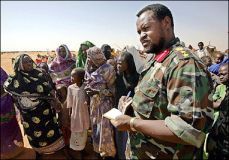Darfur rebels accuse Janjaweed, police of killing 17 civilians
CAIRO, Dec 8 (AFP) — A rebel group in Sudan’s troubled Darfur region accused pro-government Arab Janjaweed militias and the police of attacking a village in South Darfur and killing 17 civilians.

|
|
A member of the Africa Union ceasefire commission questions a group of displaced women in a section of the Abu Shouk displaced camp in the outskirts of El-Fasher, Sudan.(AFP). |
“They then mutilated the bodies and buried them in a mass grave,” the Sudan Liberation Movement charged in a statement received by AFP in Cairo and which claimed the attack took place Monday at Tawal Balal.
It added that the attackers also raped four women, including a 17-year-old girl.
The SLM said a similar attack involving soldiers transported by 42 military trucks took place Tuesday at the village of Tabit located northeast of El-Fashir, the capital of North Darfur state.
The statement claimed the government was now preparing for an all-out war in Darfur.
“We there reaffirm that the government bear responsibility for its unilateral declaration of a new war,” the statement warned.
It added that “the government bear full responsibility for the consequences of violating signed agreements.”
They were referring to an April 8 deal between the two main rebel groups in Darfur and the government and a November security protocol.
The government and rebels of the SLM and the Justice and Equality Movement routinely accuse each other of breaching the ceasefire.
The Darfur conflict erupted in February 2003, when rebels rose up to demand an end to the marginalisation of their region by Khartoum as well as a bigger share of Sudan’s riches.
Khartoum, aided by a proxy Arab militia, the Janjaweed, cracked down on the rebels and their perceived supporters, creating what the UN has described as the world’s worst humanitarian crisis.
More than 70,000 people have been killed or have died from hunger and disease in the area, according to the UN, and another 1.5 million have been displaced.
